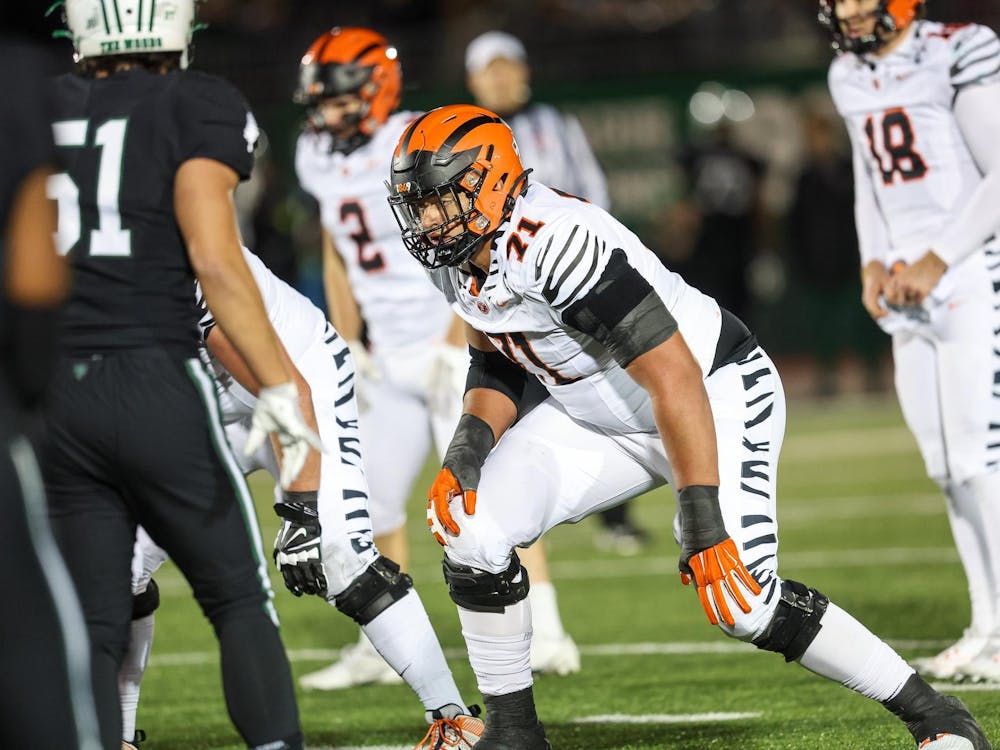For Princeton’s seniors, who make up nearly half the team, this season’s improvement was four years in the making. Over their Princeton careers, this group of longtime leaders saw significant strides in the program — and the team will be dealt a blow in losing the members of the Class of 2013. The leadership of the seniors inspired much of the team’s success and enthusiasm.
“It was their team, their season,” freshman quarterback Joe Bush said. “And they came closer to winning than they had the three years prior. While not winning is undoubtedly disappointing, their dedication helped restore competitiveness and legitimacy to the sprint program.”
The foundation laid by the senior class gives the Tigers hope for further improvement and development going into the postseason and looking into the future.
“We hope, as seniors, that we set good examples on and off the field that the younger players will emulate and build upon,” senior receiver Ross Cadman said. “We raised the bar in terms of how competitive we should be in games, and it is up to the underclassmen to continue to improve as a team in order to make strides for the program.”
In particular, the seniors and head coach Stephen Everette made efforts to see that sprint football was taken seriously as a varsity sport. This attitude is the cornerstone of the team’s postseason task of filling up their roster’s many vacated spots.
That process involves reaching out to high schools in the next couple of months when college application decisions are being made.
“The main thing we’re doing right now is getting in touch with high school coaches all over the country to get the word out about Princeton sprint,” Bush said. “Since it’s a very specific demographic, we have to talk to a lot of coaches.”
With these efforts, the team hopes to build up its roster. Traditionally, the sprint team is composed of walk-on players, with some players like seniors Sean Conrad, Cadman and Pete Purdue who were formerly recruited members of the varsity football team and decided to join sprint this season. The athletics department has not given the sprint football team any admissions slots in recruiting since the late 1990s.
“The team made noticeable improvements this year with the addition of a few recruited players,” Cadman said. “So if the [Athletic Director] and admissions office would open up the door to a few recruiting spots, we could really see this program become even more successful on the field and once again become a prominent sport on this campus.”
In addition to reaching out to potential incoming freshmen, the team will use the postseason to recruit current Princeton undergraduates to join the team.
“Another thing the upperclassmen have always done for the program is actively recruit on campus,” Bush said. “Dillon Gym, basketball courts, intramural fields all have students who may be interested in playing sprint, but just [do] not know it exists.”
Players believe this season’s improvement may make the process of finding new potential players easier. They view the attention that sprint football has received this past season as a major asset in revitalizing the program and enthusiasm for the sport on campus.

“Hopefully, with the close games this season, some underclassmen who had been hesitant to join the program due to our lack of success will now consider coming out for the team,” Cadman said. “Sprint football is an important tradition here at Princeton, and it continually needs athletes to help build the roster.”
While the task of filling out a decimated roster may be daunting, the team also has young talent it hopes will follow in the footsteps of the examples set by the graduating class.
“Underclassmen will need to fill leadership roles and positions,” Cadman said. “But I have confidence in the young guns, that they will step up and fill the void left by the graduating seniors.”







